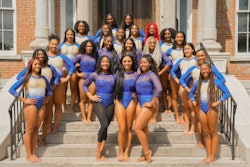 Shattering the Glass Ceiling: Blacks in Coaching
Shattering the Glass Ceiling: Blacks in Coaching
During the 2003 football season, African Americans were employed as head coaches at five of the 117 NCAA Division I-A colleges and universities. At the conclusion of the 2003 season, there were 13 head coaching vacancies at Division I-A football programs; one African American was hired. Today, five African Americans have the responsibility of leading major college football programs.
Since 1982, there have been 381 head coaching vacancies at the Division I-A level; Black coaches have been selected for 19 (4 percent) of the head coaching vacancies with 15 of the appointments occurring after 1990. In the history of Division I-A football, Black coaches have been selected a total of 21 times to lead as head football coaches.
Recent head coaching opportunities:
1996: 24 vacancies
Oklahoma hired John Blake
1997: 14 vacancies
New Mexico State
hired Tony Samuel
1998: 19 vacancies
University of Louisiana Lafayette hired Jerry Baldwin
1999: 14 vacancies
Michigan State hired Bobby Williams
2000: 25 vacancies
San Jose State hired Fitzgerald Hill
2001: 13 vacancies
Notre Dame hired Tyrone Willingham
2002: 20 vacancies
UCLA hired Karl Dorrell
2003: 13 vacancies
Alabama hired Sylvester Croom
Total Vacancies in the last eight years: 142
Black coaches have been selected for eight of the 142 (5 percent) available vacancies in the last eight years. Blake was released following the 1998 football season and Baldwin was not retained at the conclusion of the 2001 football season. Williams was dismissed during the 2002 football season after a lopsided loss to in-state rival Michigan. UCLA hired the only African American football coach at the conclusion of the 2002 regular football season. History repeated itself for the eighth consecutive year when Mississippi State hired the only African American football coach at the conclusion of the 2003 regular football season.
What needs to be done?
l Acknowledge the problem. College and university leaders must acknowledge that there is a problem with the current system used to select and hire football coaches at postsecondary institutions. Unfortunately, many well-meaning academic and athletic administrators refuse to admit that race may still be a major factor in the employment of African Americans as head football coaches. The NCAA should consider the possibility that a real problem exists and perform a careful investigation of the prevalence of racial barriers. The identification and education regarding employment barriers is necessary to create access to equal opportunity within the coaching profession.
Justice Harry Blackmun, in the landmark affirmative action case Regents of the University of California v. Bakke, stated: “In order to get beyond racism, we must first take account of race. There is no other way. And in order to treat some persons equally, we must treat them differently.” Although the data speaks loud and clear, there are many White coaches that believe that race is not an issue. Denial of the problem also contributes to the frustrations of African American football coaches in regards to employment opportunity. But barriers are hard to remove when there are coaches who have not come to grip with the reality of the problems. A White assistant coach from the Mid-American Conference shared his belief in a recent study: “I have been on three college staffs and race has never been a problem. One for all — all for one has been the motto.” A White coach affiliated with Conference USA wrote: “White coaches and Black coaches have no problem.”
l Define the term “qualified” for minority football coaches and implement specific hiring criteria and qualifications from which coaches are selected. Head football coaches are often hired without regard to specific criteria or clearly stated qualifications. Athletics administrators have shown a tendency to use extremely subjective criteria in evaluating potential coaching candidates. More academic preparation is required to be certified to coach at the high school level than is necessary to be employed as a football coach at a Division I-A institution. This point was underscored by a Mid-American Conference Black coach who stated in a recent study: “I do not believe, or I would like to think, the administrators (presidents, athletic directors, head coaches) are not outwardly racist. Unfortunately, in this profession employment is generally based on who you know. I sincerely wish resumes were taken a lot more seriously in our profession so a person can get hired/interviewed on his credentials and accomplishments.”
l Unify African American support. If African American leaders in our country would assist collegiate football programs with African American head coaches in fund-raising efforts, seek corporate sponsors who can financially support the institutions that have selected African American head coaches or shown a strong commitment to diversity, this would speak volumes and could potentially make a huge impact on future hires. Athletic directors and college leaders often make decisions based on sound fiscal principles to balance the budget. Being able to offset significant individual donations with a creative fund-raising approach could demonstrate that there will not be a significant revenue decline relieving athletics administrators of the financial risk that may come with hiring a football coach of color. The recruiting aspect of race must come into play in the African American community as well. As Black Coaches Association Executive Director Floyd Keith said so eloquently, why would you play somewhere you cannot coach?
— Dr. Fitzgerald Hill is head football coach at San Jose State University. This article is excerpted from a larger piece presented at the American Association of Higher Education Black Caucus meeting.
© Copyright 2005 by DiverseEducation.com



















